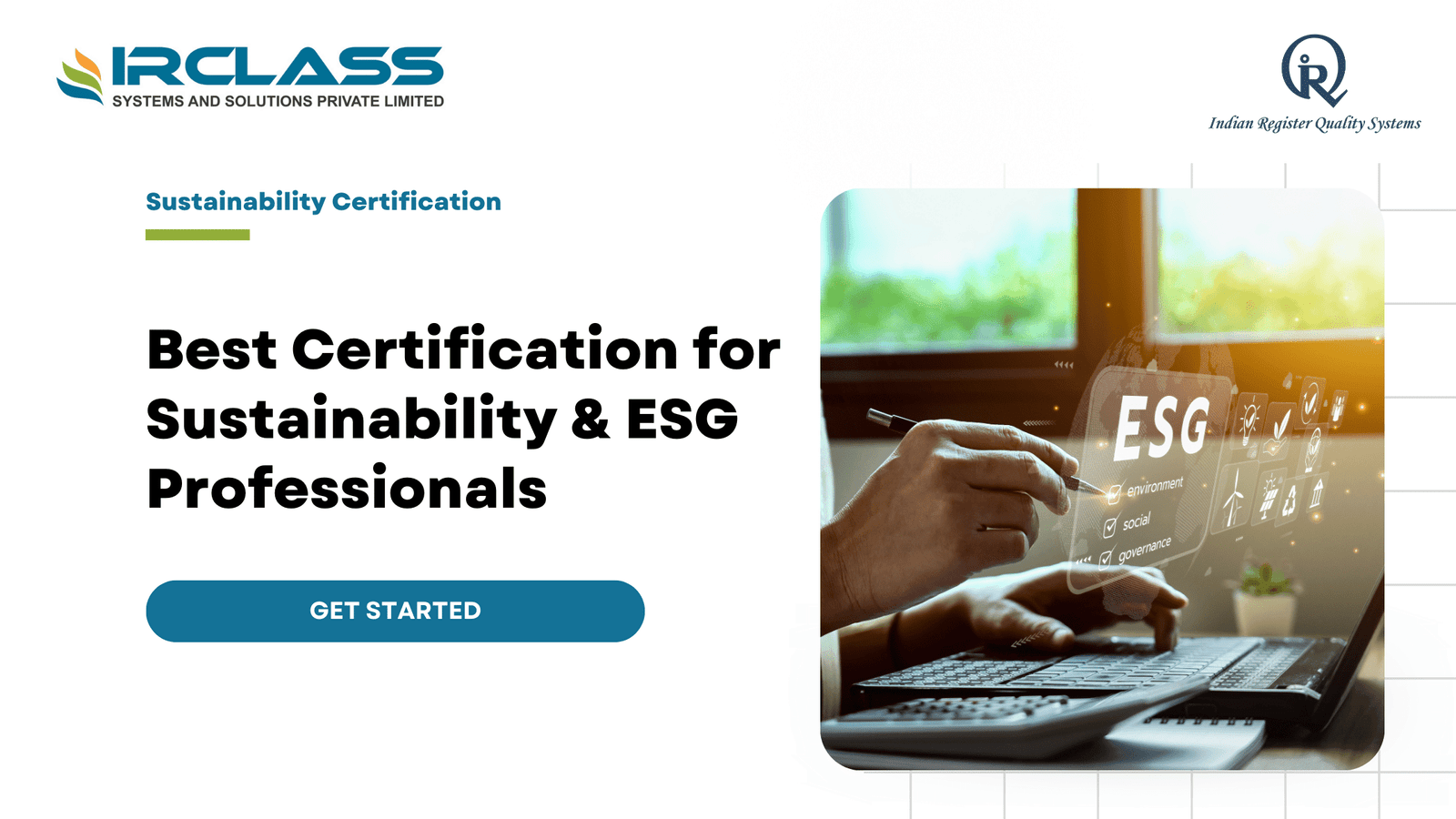Author: vishal
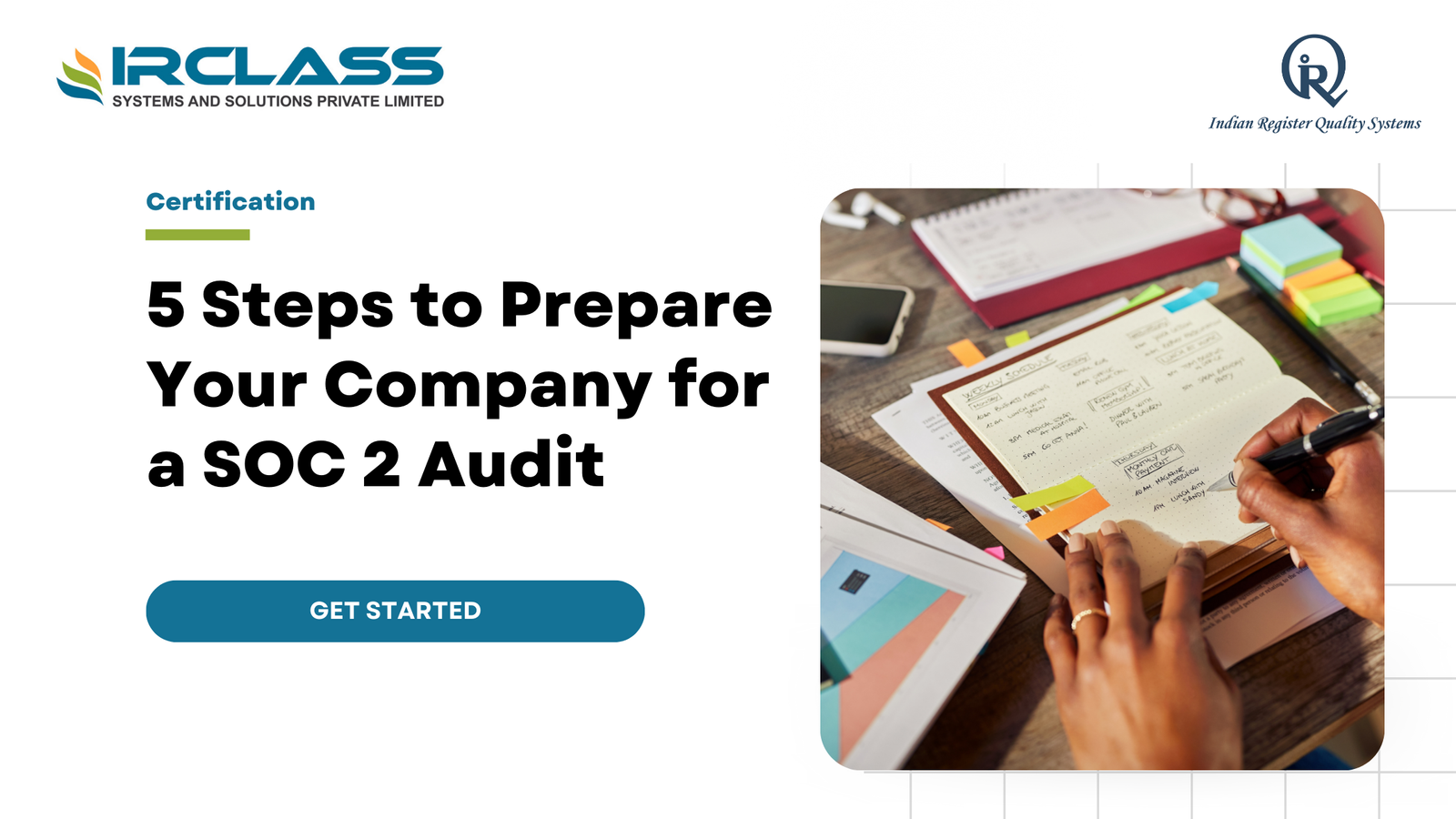
5 Steps to Prepare Your Company for a SOC 2 Audit
Today, protecting customer data is now an existential concern for businesses. If you are providing SaaS or managing sensitive client data, it is often an important milestone to achieve SOC 2 compliance. SOC 2 (Service Organization Control 2) is a framework designed to ensure that service providers securely manage data to protect the privacy of their clients. Here, we are going to cover the 5 critical steps you must take before a SOC 2 audit and how to get started on your journey of being compliant. 1. Understanding SOC 2 Requirements The first step in preparing for a SOC 2 audit is to comprehend what you are getting yourselves into. SOC 2 is not one size fits all as the certification you achieve will depend on your services and the systems supporting them. There are five Trust Service Criteria (TSC) at the center of the SOC 2 framework: security, availability, processing integrity, confidentiality, and privacy. Only security is a must-have; for the rest of them, you must pick as per your business’s nature & customer requirements. It is important to understand which of these criteria apply to your organization as they will determine the scope for audit. For instance, if an organization deals with sensitive personal data, confidentiality, and integrity attributes could be quite high on the audit scale. 2. Performing a Gap Analysis After you have a good understanding of what SOC 2 requirements are, now do the gap analysis. This is the process of determining what you are already doing in terms of security and operational controls that meet those SOC 2 criteria. It will show the areas where your organization is lagging, and you can work on them before moving to an actual audit. Before you conduct a gap analysis, evaluate your current policies and procedures to determine if the controls are in place for each relevant Trust Service Criteria. Uncover any potential vulnerabilities or deviations from the SOC 2 tier. You may have robust firewall protections but lack proper procedures for responding to incidents or control within your team. 3. Implementing Controls and Remediation The second important and logical step after the assessment of the current security position is the deployment of security controls and correction of observed deficiencies. This phase entails making tangible steps to close the gaps identified in your analysis and guarantee that your systems are SOC 2 compliant. Start by ranking the gaps according to the relevance that they have to the organization and the amount of work that will be needed to fill them. Issues that have high risk implications for security or data privacy should be considered for action first. For example, if you find out that access controls are inadequate, then put in place RBAC and MFA throughout your organization. Next, pay attention to the creation of the technical controls necessary to meet the selected Trust Service Criteria. This may include the use of encryption for data in transit and data at rest, installing monitoring systems or intrusion detection systems. Just a reminder that these controls have to be not only applied but also validated to prove that they work as planned. Another important factor in this implementation phase is the training of the employees. Your team has to adapt to new processes and security measures in the organization. Provide broad training in security awareness as well as training on the specific requirements of SOC 2. This way you make certain that your technical controls are backed up by adequate human supervision and comprehension. In this phase, it is necessary to monitor the progress and keep records of all the implementation and alterations made. These records will be useful when you get to the documentation phase and will serve to show your compliance journey to the auditors. 4. Preparing Documentation Documentation plays a huge role in the process of getting audited for SOC 2. Rather than just examining your security controls, auditors will look at your written policies and procedures to confirm that they are implemented and also followed consistently. Thus, it is necessary to document thoroughly and accurately. The first step is to document your organization’s policies, and procedures for each Trust Service Criteria that applies to your audit. These policies will detail your company’s approach to data security, availability, confidentiality, and privacy. Specifically, your data retention policy should outline the period for which sensitive information is kept and how it is disposed of (secure erase) after a period of non-use. Your incident response plan should contain a narrative of what it is that you are going to have your team do when something (really) bad happens in some type of special breach. Records should also be available on employee training, system monitoring, and internal audits. These documents show that there are not only policies, but they are enforced as well. Maintain SOC 2 documentation in a single repository that is easier to both access and update when going through documents required for the audit preparation. 5. How to Conduct a Pre-Audit Performing a pre-audit can find the last weak spots that need to be adjusted before conducting an official SOC 2 audit. If the real audit is not for a few months yet, then you can even try to pass what we might call an initial exam, or pre-audit. Hiring an independent consultant or auditor to perform your pre-audit can be helpful as they will conduct a more neutral evaluation of both controls and documentation. This way, they can analyze all your systems, and what you might have missed as risks. Having this new perspective on things before the actual audit starts can be valuable for anything that might have been overlooked. You should also take this opportunity to test your organization’s incident response and security controls in a pre-audit. Thus, fixing any critical situations during the pre-audit stage itself can help you clear an official audit and get your SOC 2 certification with ease. Conclusion Having a SOC 2 certification is a way to prove
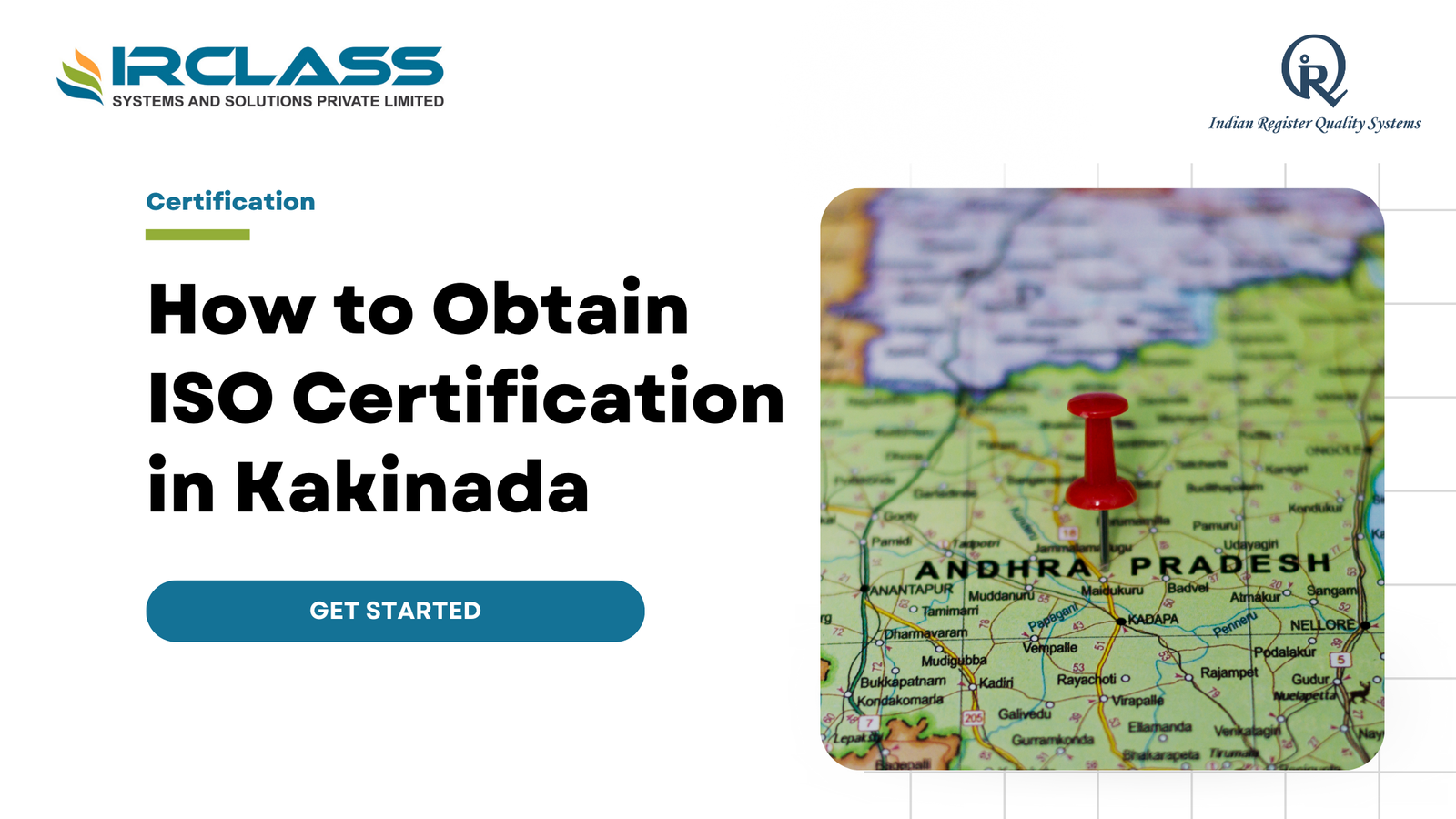
Why ISO Certification is Crucial for Kakinada’s Growing Industries
Kakinada, a growing industrial city in Andhra Pradesh, has become a hub for sectors like oil and gas, agro-processing, and manufacturing. As these industries expand, maintaining consistent quality, safety, and environmental standards becomes essential. ISO certification offers businesses in Kakinada the opportunity to align with global standards, enhance operational efficiency, and build trust with stakeholders. In this blog, we will explore why ISO certification is crucial for Kakinada’s booming industries. The Importance of ISO Certification ISO certification is a set of international standards that ensure quality, safety, and efficiency across various industries. Whether it’s ISO 9001 for quality management, ISO 45001 for occupational health and safety, or ISO 14001 for environmental management, ISO certification helps businesses in Kakinada stay competitive and compliant with global regulations. Benefits of ISO Certification for Kakinada’s Industries Conclusion For Kakinada’s growing industries, ISO certification is more than just a compliance measure—it’s a strategic tool for long-term success. From improving operational efficiency to gaining international recognition, ISO certification offers numerous benefits. If you’re looking for a trusted certification body, IRQS (Indian Register Quality Systems) is a leading name in ISO certification. With their extensive expertise, they guide businesses through the certification process and provide ongoing support to ensure compliance with international standards.

How to Obtain ISO Certification in Coimbatore: A Complete Guide
Coimbatore, often called the “Manchester of South India,” is a hub for textile and manufacturing industries. As businesses in this city thrive, many seek ways to improve efficiency, quality, and customer satisfaction. One of the most effective ways to achieve this is by obtaining ISO certification. This guide will walk you through the process of obtaining ISO certification in Coimbatore and why it is essential for businesses aiming to scale up their operations. Understanding ISO Certification ISO certification is a global standard that ensures a company’s products and services meet international quality benchmarks. Obtaining certification can give your business a competitive edge, whether it’s ISO 9001 for quality management, ISO 14001 for environmental management, or ISO 45001 for occupational health and safety. It also demonstrates your commitment to maintaining high standards in all business processes. Steps to Obtain ISO Certification in Coimbatore Conclusion Obtaining ISO certification in Coimbatore can significantly enhance your business’s reputation and operational efficiency. Whether you are in textiles, manufacturing, or any other sector, certification is a mark of quality that can attract new clients and retain existing ones. For businesses looking for a trusted certification body, IRQS (Indian Register Quality Systems) offers reliable services. IRQS is a recognized leader in providing ISO certifications across various industries, ensuring a smooth certification process and ongoing support.

The Benefits of ISO Certification for Oil & Gas Companies
Safety, Quality, and Efficiency are very important to the oil & Gas Industry which is one of the most regulated as well as competitive. For maintained standards, an alternative is ISO certification. ISO certifications were born to deliver a model for quality process control and operational excellence. ISO certification is an overall guarantee for oil and gas companies that entails various benefits, from improved operational efficiency to increased stakeholder confidence. This article discusses the following aspects of ISO certification for oil and gas companies: 1. Enhanced Operational Efficiency ISO certification assists in streamlining the processes of oil and gas companies, thereby enhancing operational efficiency. Companies can minimize waste and errors, and optimize resource utilization by adhering to standardized procedures. An example would be ISO 9001 which is about quality management systems in general and provides a guarantee that organizations have established processes for customer-satisfied quality assurance, as well as continuous improvements. This will lead to smoother operations, less downtime, and productivity gains too. 2. Improved Safety and Risk Management Safety is a significant issue in the oil and gas sector as many dangers appear. Organizations can understand the risks involved in their operations with ISO 45001 compliance, which covers an occupational health and safety management system. To avoid any such future accidents, companies can ensure the safe working conditions of their employees and stringent auditing at regular intervals. Not only does this reduce the potential of accidents and injuries, but it also shows a genuine care for employee safety as well as regulatory compliance. 3. Enhanced Environmental Performance Oil & Gas companies understand the importance of environmental sustainability. The ISO 14001 certification concerns the standard for an environmental management system and provides a framework that allows you to achieve more effective environmental responsibilities. Through the achievement of the certification, companies can progressively shrink their environmental footprint, minimize waste, and enhance operational resource-use efficiency. Apart from meeting regulatory needs, the feature buttons up an organization against perceptions of ecological irresponsibility that can damage its status with stakeholders. 4. Increased Customer Satisfaction We all have heard about almost ISO certification is the name of trust and quality. ISO 9001 certification is also important for oil and gas companies through the ability to reassure customers that even in a competitive business environment, their company meets high standards of quality when it comes to products, services, or other areas. ISO 9001 establishes that an enterprise has standard processes and continuous improvement structured into its operations to deliver products or services in a way that will meet customer requirements consistently. Doing this can help to improve customer satisfaction, and loyalty and increase repeat businesses. 5. Competitive Advantage Now this is more important in an area like oil and gas where the competition for jobs is fierce. ISO certification can be a major point of difference, demonstrating the caliber and responsibility that your organization has to quality, safety, and the environment. Most customers and especially partners in this industry are willing to work with ISO-certified companies due to the benefits they offer better quality of services, which equates to lower risks for them. Such an advantage allows ISO-certified companies to compete more effectively for contracts and generate new business. 6. Regulatory Compliance Oil and gas companies work in a high-regulated sector subject to countless national, and local populations including international law. ISO Certification: These provide the necessary framework to push companies to maintain and sustain their hold on these regulations. ISO 14001: This certification ensures compliance with environmental laws, and ISO 45001 is for safety regulations. While keeping ISO Certification, companies steer clear of legal goofs for that reason greats and confess their commitment to staying with regulatory principles. 7. Improved Stakeholder Confidence Transparency and accountability are held near to the hearts of stakeholders which includes investors, partners, and customers. It gives a third-party confirmation that the company is complying with international standards and hence may create value for stakeholders. This is extremely coveted in the oil and gas industry as their projects are typically expensive, risky propositions. Increased confidence with stakeholders leads to solid relationships, great opportunities for investments, and a growing business as well. Conclusion ISO certification provides a large number of advantages to oil and gas companies in terms of improved operational efficiency, safety as well Stakeholder confidence, competitive edge, etc. Following globally accepted norms and regulations will allow businesses to deliver at a consistent level of quality, and lead the compliance game all while promoting lean methodologies. ISO Certification is a very helpful tool for ensuring quality in an industry where there is no place for less than the best.

ISO Certification for Construction: Key Standards and Compliance Requirements
Construction is an extensively considered field, where multiple defined standards are maintained for quality management and safety purposes in the construction area or site. Of these norms, ISO certification is seen as a game changer that provides construction companies with standards for delivering top-of-the-line projects. Following that, we will delve into the major ISO standards of the construction industry and what needs to be done for an organization to become certified. The role of the (International Organization for Standardization) ISO is to develop and publish international standards designed to make sure materials, products, processes & services are fit-of-purpose. The need for ISO certification in the construction industry is critical, helping to improve operational efficiency while controlling risks as well as expanding clientele. ISO 9001: Quality Management Systems ISO 9001 provides a model quality management system (QMS) that follows some key principles of good project governance, like being built around the customer, top managers are committed to what you are doing and why it matters( in short they involve themselves), systematic process approach which goes hand-in-hand with continuous improvement. ISO 9001 certification for the construction sector, underscores service quality to most of its customer and their statutory points; along with a system upgraded in terms of value delivery. ISO 14001: Environmental Management Systems ISO 14001 is a standard that sets out the requirements for an environmental management system (EMS). It provides an organized process to manage environmental responsibilities in a way that contributes to the fixture of sustainability for all sections, from site work services companies and facility managers. Key compliance obligations are the establishment of an EMS that complies with ISO 14001, identification and management of environmental aspects & impacts, setting and achieving environmental objectives & targets, ensuring legal or otherwise regulatory compliances & continual improvement in the environmental system. ISO 45001: Occupational Health and Safety Management Systems ISO 45001 is an international standard for management systems of occupational health and safety (OH&S) that provides a system model capable of satisfying the need to reduce work-related injuries, diseases, and deaths will establish safe places & work environments to prevent work-related illnesses and injuries in addition promoting health at the workplace. Some of the key compliance requirements, including developing OH&S policy and objectives identifying significant risks and opportunities related to health & safety implementing controls that address those risks providing mechanisms for worker participation in consultation are not so surprising. ISO 50001: Energy Management Systems ISO 50001 is a standard that gives organizations the means to conserve energy, in all age sectors, through EnMS: Energy Management System. This standard is of particular interest to construction companies, whose work consumes a lot of energy. Main compliance obligations involve the development of an EnMS based on ISO 50001, Energy Reviews & Baselines, setting energy performance indicators and objectives as well as implementation plans to improve water-energy performances & resultant monitoring/measurement/data analysis tasks. What are the Benefits of ISO Certification in Construction Companies? Improved Reputation: By showing an effort to be on the mark regarding quality, safety, and environmental management it can assist in your company reputation as well as help you gain trust from clients. Operational Efficiency – Standardized processes and continuous improvement lead to lower costs through reduced waste. Risk Management – Managing risks in advance related to quality, environment, and safety leads to accident prevention and non-compliance problems. Market Requirement: ISO certification is often the prerequisite for being considered eligible to tender for a project or receive invitations from potential customers. How to get ISO Certification in Construction? Obtaining an ISO certification typically follows a pattern, which usually includes the following steps: 1. Gap Analysis Perform a Gap Analysis: Do your current management systems provide experience or familiarization with the new ISO standard? This will allow us to find out where we lag and need more fit. 2. Training and Awareness Get all employees to know just how critical the ISO requirements are and what role they have in achieving that compliance. Offer appropriate training to address any gaps in knowledge. 3. Documentation Prepare Documentation According to The ISO Standards: Develop and maintain documentation of your processes, procedures, and policies in compliance with the standards. This encompasses the generation of manuals, practices, work instructions, and records. 4. Implementation Deploy the documented procedures and processes organization-wide. Ensure that the staff is following all new or updated practices. 5. Internal Audits You must be taking the measure of internal auditing to gauge how effective your management system has been. It facilitates the detection of failures and improvement points. 6. Management Review Conduct management review meetings to assess the effectiveness of existing management systems and decide on any required changes or enhancements. 7. Certification Audit Make an appointment with a certification body to carry out an independent audit of your management systems. The ISO certification is issued by the Certification Body if your systems meet those standards’ requirements. Conclusion To sum it up, ISO certification plays a major role in construction companies that want to maintain their quality management standards as well as work on environmental responsibility, occupational health and safety (OH&S), or energy efficiency. When a construction firm aligns with ISO 9001, ISO 14001, and the new related standards like Codes for practice as well as International Standards of Construction Practice it stays in compliance with other customer regulatory requirements For companies that wish to be certified ISO, a certification body is important. One of them is IRQS (Indian Register Quality Systems) which provides complete certification services and experience. To learn more about ISO Certification or for information on their services stop by the IRQS blog at – IRQS Blog The expertise and advice will make sure your building company can attain the highest levels of quality as well as compliance with ease.
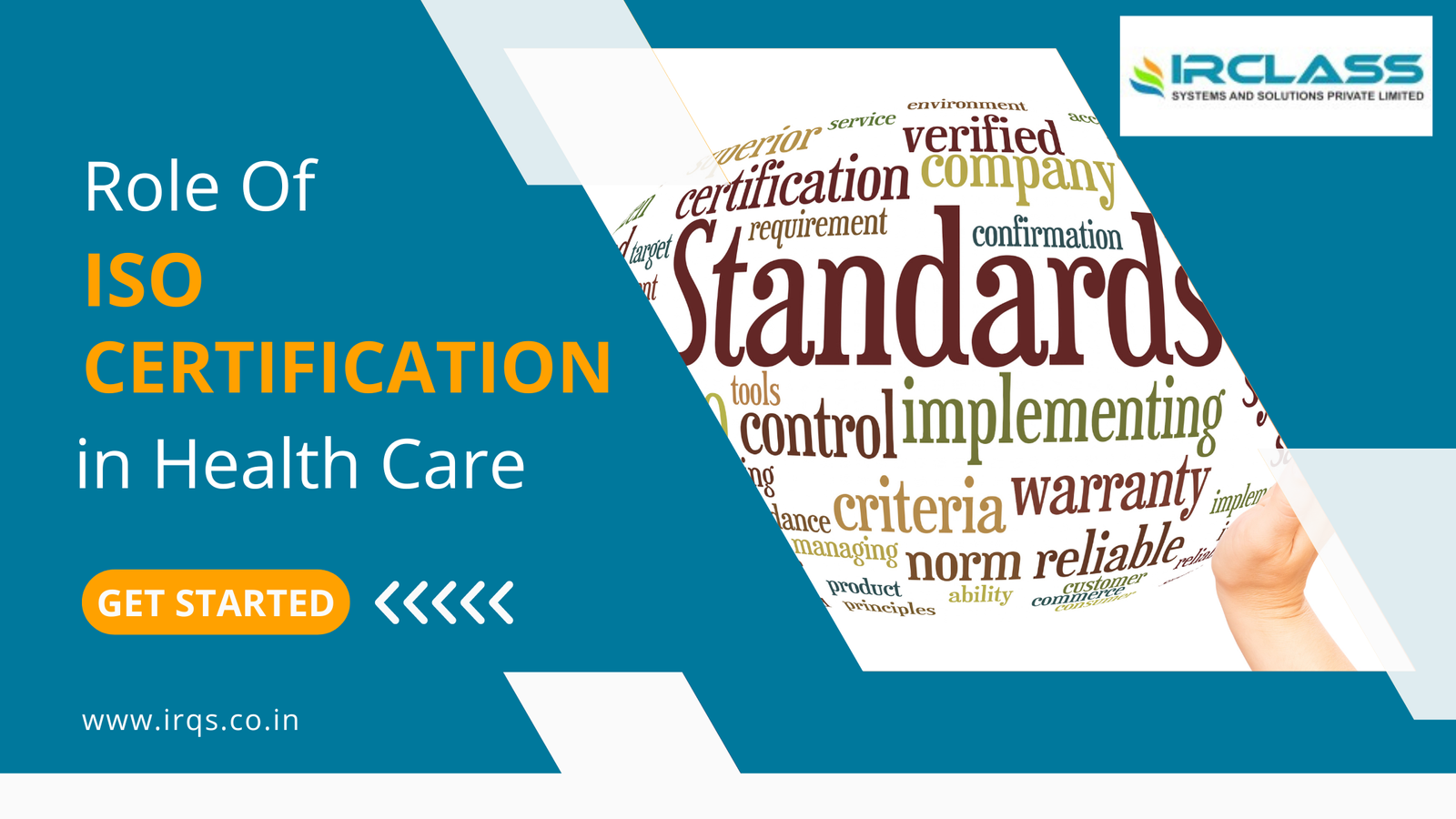
The Role of ISO Certification in Health Care Quality Management
Quality management in the expanding and changing healthcare field is an essential part of quality healthcare that exists to protect patients, staff members, and others affected by individual performance. It is through ISO certification that you can achieve this in the best possible manner. The International Organization for Standardization (ISO) developed a set of internationally acknowledged standards that assist organizations in meeting the needs of customers and other stakeholders. The health sector relies heavily on ISO certification for quality control, patient safety, and streamlining service delivery. In this article, we will understand the role of ISO certification in healthcare quality management. Role of ISO Certification in Health Care Quality Management 1. Enhancing Quality Management ISO Certification helps a healthcare organization in building an effective quality management system (QMS). This system is made up of different components, including hazard management and process control but also continuous play improvement. ISO standards can help healthcare providers improve patient outcomes, reduce errors, and improve their processes. Continuous improvement is a very important part of ISO certification To keep these processes effective and efficient, healthcare organizations are encouraged to review their processes regularly. Take this preventative quality management action, and find the problems before they grow into big issues which inevitably results in better care overall. 2. Ensuring Patient Safety Patient safety remains a central theme associated with quality management in health care. There are high standards of quality control and process management built into ISO certification, in particular concerning the very idea behind every single one of these processes should be risk mitigation. Healthcare organizations ensure a safer environment for patients when they adopt these standards and risk areas are identified 3. Improving Service Delivery ISO certification also places lots of emphasis on providing better quality health care service to patients. Healthcare organizations can use standard practices and best practice implementation to deliver a product of high quality with consistency as its key. That is better for the patient and it helps earn a health care provider’s trust. 4. Global Recognition and Compliance The Global Acceptance of ISO certification is One of the Key Benefits. ISO certificate is proof that the healthcare provider has an excellent quality of work. This is especially useful for businesses who want to take their services overseas or work with international partners. ISO certification also helps in meeting regulatory requirements. 5. Ensuring Patient Safety Patient safety is an essential component of healthcare quality management. ISO standards, and in particular ISO 9001 also specifically address risk management/process control. These standards can help healthcare organizations identify and manage risks, keeping patients safe. For instance, under ISO certification health care providers should have strict procedures for the receipt and storage of medical supplies/medications. 6. Better Compliance with Regulations Health care is a heavily regulated field with broad compliance requirements. This kind of regulation becomes further strict, codes are established by the authorities and ISO Certification is useful for healthcare organizations to certify that they meet regulations consistently. For instance, compliance with ISO standards often coincides with other local and international regulations thereby reducing the risk of facing legal troubles or penalties. It also improves the organization’s credibility and reliability. 7. Higher Operational Efficiency Once adopted, ISO standards help such operational processes as health care practice in health organizations to be carried out much easier. This results in reduced inefficiency, waste, and resource consumption. This can enable healthcare providers to deliver their service more effectively, and frequently at a lower cost. Deeper efficiency saves everyone time and allows them to focus more on patient care versus administrative work. 8. Improved Data Management and Security From data management to securement, ISO standards detail how you can learn how and when your company should be following these procedures. Health data is sensitive information and compliance with such standards ensures that patient data stays safe, as all possible security measures are being taken care of. This lowers the chances of data breaches and adheres to privacy regulations which earns trust from patients as well as stakeholders. Conclusion To sum up, the health care quality management should be based on ISO certification. It is a system of structured review processes used for managing and improving the quality, safety, and services launched in hospitals. Using ISO standards can help healthcare organizations establish a global presence, adhere to regulations/guidelines, and offer better patient services at last. Although the process for ISO certification can be difficult, it is a worthwhile task to attempt and accomplish when providing patients with first-rate health care. Quality certification is a process and collaborating with an experienced company in the field of getting health care ISO certified is important. IRQS (Indian Register Quality Systems) provides an extensive range of certification services, specializing in healthcare. IRQS will be able to steer you on the right path and under their guidance, your organization can achieve the highest standards in quality management. IRQS is here to provide the necessary support if you would like to raise your health care services through ISO certification.

Comprehensive Guide to Conducting an Energy Audit for Your Business
Comprehensive Guide to Conducting an Energy Audit for Your Business Energy audits are indispensable in the discovery of imbalances and optimization of costs. They include appraisal of energy consumption, identification of loss, and recommendations for enhancement. Companies themselves will also be able to reap benefits from these audits. Organizations could save more energy by making changes following the audit results. Doing business audits keeps your business on the right side of energy conservation and manageable expenditure. Benefits of Energy Audits An energy audit is very beneficial in that it assists in cutting expenses on utilities and lowers the impact on the natural world. Energy efficiency enhancements reflect systems optimization of organizational activity. It has been proven that audits can reveal concealed areas of inefficiency. Hence, it plays a part in making your company environmentally friendly and sustainable. Preparing for an Energy Audit Preparation is essential for an effective energy audit. To begin with, one must compile every piece of information, from utility bills to lists of equipment. Understand the layout of your facility and its usage of energy. Determine activities and processes that consume more power. This information will assist the auditors in properly evaluating energy requirements and waste on your undertakings. Choosing the Right Auditor Getting the right auditor is crucial. Search for certified employees who have worked for a couple of years in this industry. An efficient auditor will consider details and implementable solutions. Ensure you confirm their credibility and other clients’ experiences. Hiring a professional increases the chance of getting an accurate report. Initial Walkthrough The initial communication is the first step in the audit, known as the walkthrough. In this phase, the auditor physically scans your facility. It is necessary to mention the equipment, lighting, and HVAC systems available in the facility. Lack of access to files allows the systematic observations and presence of apparent problems during the walkthrough. Although it appears as a general step, it paves the way for a detailed strategy analysis. Detailed Data Collection Data collection is one of the vital processes in the auditing framework. Auditors collect information that relates to energy use and performance of systems. They analyze the consumption of energy by using specific instruments for this purpose. This data is the starting point for analyzing the system and defining areas of problems and possible optimizations. Analyzing Energy Consumption Energy audit focuses on collected data performance analysis. While examining energy use, auditors also appear to correct trends and variations. They compare it with other industries related to your field of activity. The analysis used assists in defining the places where energy is drained. Hence, comprehending these patterns is crucial for identifying the correct energy-saving measures. Identifying Inefficiencies When data is processed, auditors now look for areas of improvement. These could be outdated equipment, poorly insulated structures, or inadequate lighting sources. They identify places in which energy could be saved. These inefficiencies help in devising a strategy to deal with them. Recommending Improvements Of the listed inefficiencies, auditors make suggestions. Some of these suggestions may refer to the update of machinery, improvement of the insulation, or change of lighting. They are made so that they suit the client’s specific requirements. These changes can go a long way toward cutting down on energy consumption. Recommendations should be implementable, realistic, and if possible inexpensive. Prioritizing Actions It is okay not to address all recommendations at the same time. Rank the activities according to imposing effects and implement them accordingly. Introduce other recommendations in a step-by-step manner depending on capacity. This phased approach, when adopted, ensures that the implementation is done systematically and to the maximum benefit of the verification organization. Implementing Changes Execution is the next step for all the strategies that may have been developed or plans that may have been outlined. Implement the suggested changes in phases. It is vital to supervise the process as much as possible for it to be without hitches. The parties in the project should address any emergent problem before it distorts the other aspects of the project. This reception results from successful implementation, which enhances energy efficiency and lowers costs. Evaluation and Monitoring It is also imperative to periodically testify to the solution. Reporting energy usage and projection is another method since the effectiveness of the changes can be assessed by measuring usage. Determine whether the changes that have been made are yielding the intended outcomes. Daily supervision ensures energy saving and finding ways of increasing it. Employee Involvement People’s involvement is vital to maintaining energy efficiency in organizations. Inform your team regarding the significance of energy conservation measures. Try to make them change for the better in their daily workplace conduct. One of the ways is the employees’ commitment, which supports the sustainability of the changes realized from the audit. Ensure that the organization’s rules and regulations are followed during the implementation of the energy efficiency program. Benefits of Consistent Improvement Energy efficiency is a continuous process that needs to be embarked on or pursued by human society. Audits must be performed regularly, and changes implemented should be sustainable, thus providing long-term gains. Learn the current knowledge and skills used in the present job market. Timely review and update the energy-saving strategies being implemented. It is because continuous improvement assists your business in avoiding achieving and maintaining its competitive advantage and sustainability. Increase the success of an energy auditing The following guidelines will help you in having a successful energy audit: – Gather Comprehensive Data: Gather accurate data concerning your facility’s energy consumption and the energy-using systems. This data is vital as it will enhance the appropriate execution of analysis. – Engage Qualified Auditors: Hire professional and experienced auditors so that the outcomes will be accurate and you get good recommendations. – Prioritize High-Impact Actions: Prioritize the measures that yield maximal energy-saving results. – Involve Employees: Promote power conservation to your staff to retain and improve their performance. – Monitor and Evaluate: Monitor the energy consumption and examine
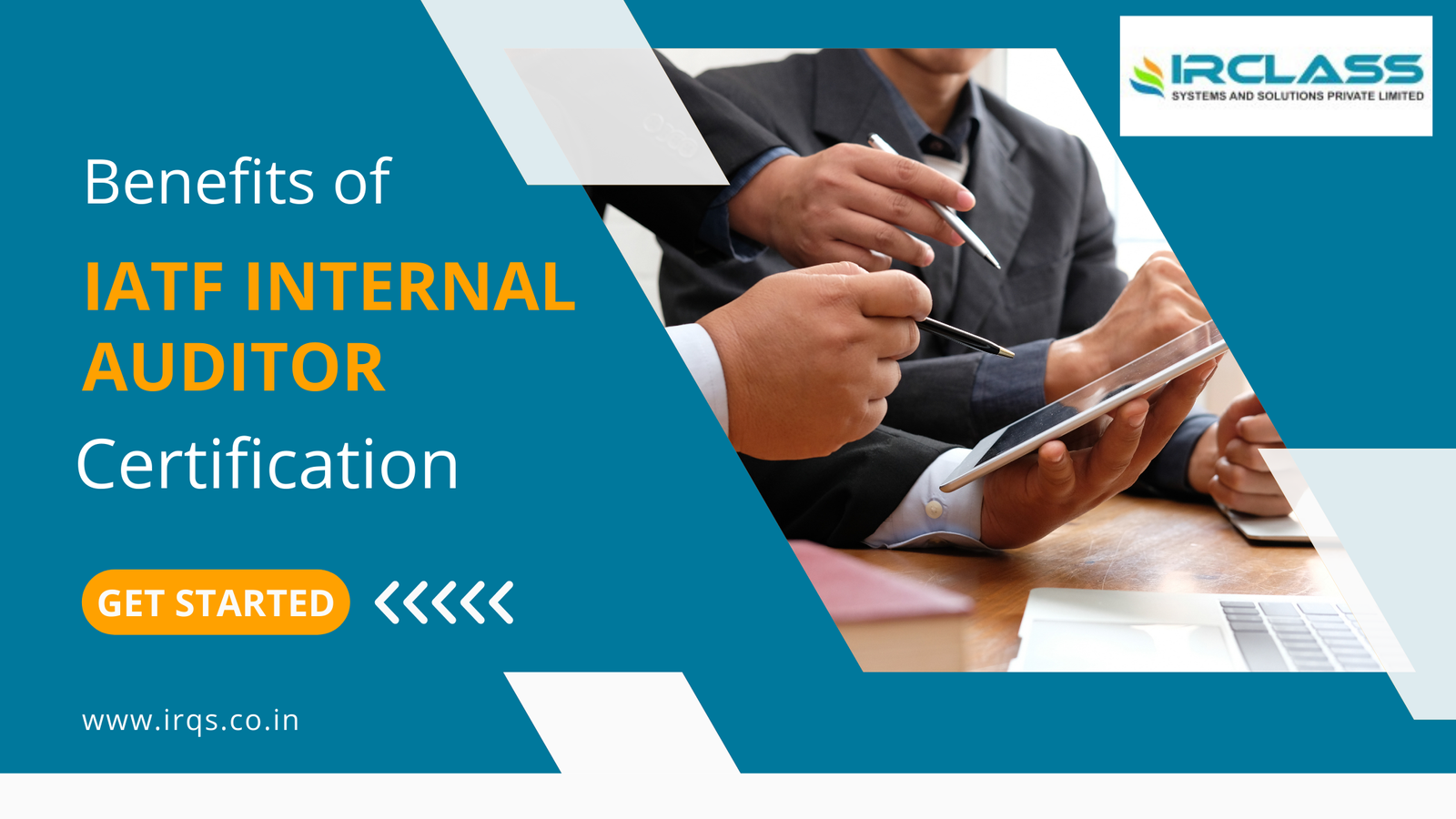
The Benefits of IATF Internal Auditor Certification for Your Career
The Benefits of IATF Internal Auditor Certification for Your Career In the expansive field of quality assurance, you can achieve a rewarding career with suitable and advanced qualifications. The IATF is one such certification that you should obtain. Its full form is the International Automotive Task Force. With this certification, you can assist organizations to improve their Quality Management System (QMS) by becoming an IATF 16949 Lead Auditor. Also, you can apply your newly acquired knowledge in Automative Core Tools to benefit the company. Previously, it was ISO/TS 16949:2009 that met customer requirements. The upgrade focuses on risk evaluation and a more comprehensive approach, complying with the industry trends. A significant change is the certification now aligns with the ISO 9001:2015 standards. It enables the companies to flawlessly integrate the standards with other quality management systems in their business frameworks. How It Works The standard requires auditors to review and verify that automobile companies adhere to strict standards for quality management. The procedure for certification usually involves thorough education, passing an exam followed by a series of tests to show proficiency. When they have completed this process auditors show their capacity to assist organizations in meeting the international standards for automotive quality and ultimately lead to better products, greater customer satisfaction, and top-notch procedures. Requirements for Certification Benefits You Receive by Obtaining the Professional Certificate Enhanced Career Opportunities One of the most significant advantages of getting this certificate is the substantial increase in the opportunities for your profession. Since the auto industry is very competitive and quality-focused those who have this accreditation are sought after. Increased Knowledge and Skills You gain top skills like performing detailed audits, identifying violations, etc. The skills are highly transferable and could enhance your competence as a professional. Professional Credibility Possessing the IATF Auditor Certification adds value to your professional resume. It demonstrates to the public and your colleagues your expertise concerning compliance with the strict requirements of your industry and your skills for conducting efficient audits. Improved Company Performance You assist your company in identifying areas for efficiency, decreasing waste, and improving overall effectiveness. The results can be better product quality, greater satisfaction of customers, and excellent financial performance for your company. The work you do as a certified auditor could directly and positively influence the success of your company, and it will reflect positively on your job. Networking Opportunities Achieving and maintaining this certification could also increase your professional circle. Training and certification programs typically include interaction with professionals working in the field. It provides the opportunity to exchange knowledge about experiences, knowledge, and the most effective techniques. Keeping Current with the Latest Industry Trends The industry of automotive is continuously developing, with new techniques as well as regulations and quality standards constantly being introduced. Acquiring the IATF Internal Auditor Certification will help to keep you up-to-date with the most effective strategies. Personal and Professional Development Earning the certification is rigorous and requires a lot of dedication and commitment. The certification can be an essential source of happiness for professional and personal fronts. It shows your capacity to create and reach ambitious goals, increases your ability to solve problems, and increases confidence in the capabilities of your profession. Establishing and Maintaining Compliance As an auditor-certified, you assist your company in navigating the many complexities that come with standards and ensure that the procedures, documents, and processes comply with accepted standards. Improving the Work-Environment Audits conducted by internal auditors are essential in creating a quality culture in an organization. When employees are aware that their organization is committed to high standards and continually making improvements, it will boost motivation and enthusiasm. Being a certified internal auditor is essential in fostering a positive working environment. Facilitating Risk Management The IATF Standard 16949 focuses on risk-based thinking which is vital for recognizing the potential risk within an organization. As an internal auditor certified is certified to analyze risks that come in quality-related processes and implement strategies for managing those risks efficiently. Career Flexibility and Mobility The knowledge and skills gained by completing IATF Internal Auditor Certification IATF Certified Internal Auditor is highly transferable giving you more career flexibility and freedom. Contribution to Industry Standards Being an internal auditor certified you can contribute to the overall business by being involved in developing quality standards. The knowledge and experience gained from your hands will be invaluable in determining future revisions to the IATF Standard 16949 or any similar standards. Combining practical experience with theoretical Experience and Knowledge The Internal Auditor Certification procedure effectively balances the theoretical understanding with hands-on experience. Training programs offer in-depth knowledge regarding the IATF 16949 standard. In addition, the auditing requirements ensure that you can use these skills in actual situations. Combining theory with application gives you skills highly sought-after by companies. Developing a Strategic Mindset Internal auditing and Quality Management are not just about complying with procedures, they demand an underlying strategy. When you become an accredited internal auditor, you consider what quality management practices align with the organizational goals. Learn to look at the big picture and appreciate how quality management can ensure business performance. Conclusion The Internal Auditor Certification of the IATF has multiple benefits that will significantly affect your professional and career development. It can help you increase your opportunities for advancement and credibility in the workplace to promote constant improvement and create an environment of excellence within your business.
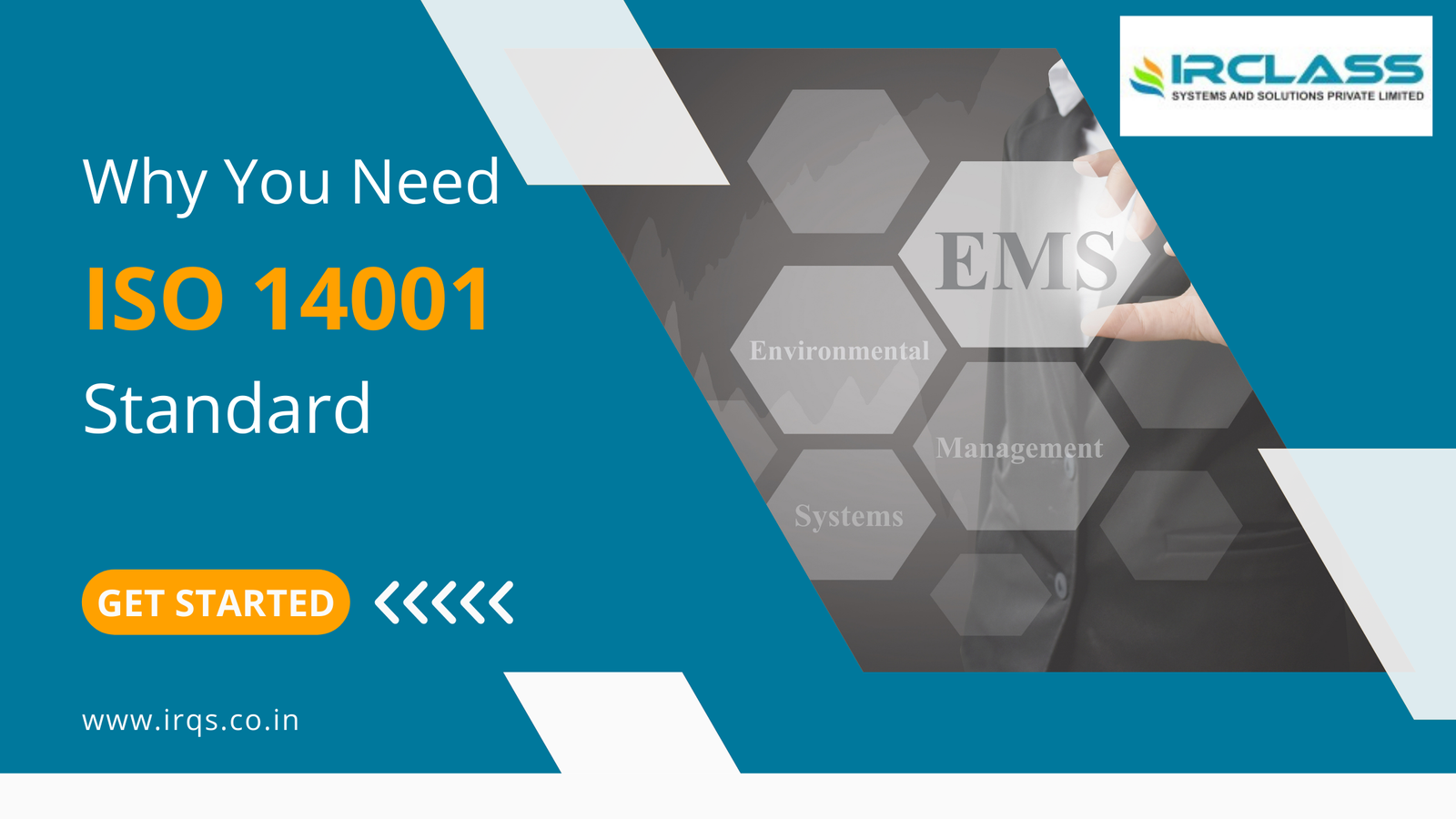
Why Your Business Needs ISO 14001 Standard Certification
Why Your Business Needs ISO 14001 Standard Certification It is all about helping companies to be more environmentally conscious. It’s sort of a manual which companies can use to be certain that they’re eco-friendly. Consider it an emblem that indicates the company’s commitment to safeguarding the environment. This is how it goes. It starts when a company decides to go more eco-friendly. They consider all activities they perform that could impact on the environment, such as producing waste or using energy. After that, they apply ISO 14001 rules to set an action plan. This helps reduce the impact they have on the environment. Being certified isn’t one time thing. Businesses must continue to work to improve their environmental plans and be examined by professionals to be sure they’re doing the right thing. If they’ve satisfied all specifications, they receive their ISO 14001 certificate. Businesses and customers recognize this and have confidence in the business to be concerned about the earth. ISO 14001 is like an agreement between businesses and the environment. It ensures that everyone does their part in keeping the Earth well. Practical Reasons Why Your Company Should Get the Certification Today, companies don’t just focus on money. Additionally, they have a responsibility toward society and the environment. The certification helps businesses meet this obligation through a focus on the management of environmental issues. These are the main benefits for businesses to look into have ISO 14001 certified: 1. Reducing Negative Impact on the Environment It makes it easier to recognize and control the aspects of your business that may harm environmental quality. Following these guidelines will help you cut back on pollution, eliminate waste, and use resources more efficiently. 2.Saving Costs Improvements in environmental practices often result in costs savings over the long term. ISO 14001 helps you identify possibilities to lower energy use and waste production and improve the efficiency of resource usage, through implementing these methods that, your company can cut operating costs, increase efficiency, and let you into new sustainable markets. 3. Boosting Engagement of Employees The company becomes an inspiration to its new and old employees. They are proud to work in a firm that shows concerns about the environment. It increases their morale. It helps in better collaboration. Also, it encourages creativity among team members. People who are motivated and engaged are more efficient and loyal, which will help your company over the long run. 4. Improved Supplier Relations Nowadays, it is a practice to choose suppliers that boast environmental responsibility. The certification integrates an ethical code in a regulatory framework. There is understanding between stakeholders. There is a genuine focus on sustainability. The collaboration could lead to greener practices in your business’s ecosystem. 5. Improving Risk Management When there is more expertise to manage risks concerning the environment, business operations become more efficient. The certification integrates the method to proactively evaluate the various risk factors. Also, there are provisions to counter them. The response is prompt. This approach reduces the chance of disruptions and improves overall business continuity. 6. Demonstrating the power of Leadership This shows you’re dedicated to making a lasting impact on the environment beyond financial success. Your Leadership can inspire others, such as customers, investors, and the communities surrounding them, to believe in and trust the business. This positions your business as a good corporate company, which helps to sustain development and better the environment. In a nutshell, ISO 14001 certification offers numerous advantages for companies looking to incorporate environmental responsibility into their business practices. The requirements you should consider to receive the Certification This is what you have to complete: Learn the standard: Study and know the ISO 14001 standard. It pertinently defines the criteria to establish a successful Environmental Management System (EMS). The Top Management Commitment: Your top managers need to understand the issues clearly. They must also demonstrate dedication to environmental management, define clear policies, and distribute funds. Determine Environmental Impacts: Determine how your processes impact the natural environment. This can include the production of waste, energy consumption, and emission levels. Legal and other requirements: Identify relevant legal and regulatory requirements related to the environment and ensure compliance. Goals and Targets: Set measurable environmental goals and objectives. They should be precise as well as achievable. They should also be aligned with the policy you have established. Roles and Resources: Allocate necessary resources. Set out roles and responsibilities for creating and maintaining the EMS. Training and Education: The employees must know the EMS and what they are expected to do. Training is necessary and should be provided to raise awareness. Information: Develop necessary documentation, such as an environmental policy, targets, and procedures. Ensure that these documents are appropriately controlled and kept up-to-date. Operational Control: Establish procedures for managing your operations’ environmental impact. This may include regulating garbage disposal, reducing power consumption, and eliminating pollution. Emergency Preparedness: Develop a plan to handle potential emergency situations in the environment. Instruct employees on how to react effectively. Monitoring and Measurement: Always monitor your performance in the environment. This will help you see how you are progressing towards your goals. Internal Audits: Conduct internal audits to ensure the EMS functions as it should. Find areas of improvement. Managerial Review Management: The EMS should be reviewed frequently at the top to check its ongoing suitability, effectiveness, and efficiency. Continuous improvement: Seek ways to increase your efficiency in environmental management and EMS. Implementing ISO 14001 To put ISO 14001 into action: Strategy: Follow these steps: Verify: Monitor and measure your performance in the environment. Perform regular audits to ensure all is running just as it should. Act: Based on audit results and performance statistics, make changes to enhance. Change your procedures and processes whenever necessary. Conclusive Note It’s about obtaining certification and making a genuine commitment to implementing more nature friendly practices. The ongoing commitment to environmental sustainability cannot just benefit the environment but help improve your company’s reputation and efficiency.

Top Reasons to Implement ISO 14001 Standard in Your Organization
Top Reasons to Implement ISO 14001 Standard in Your Organization What exactly is ISO 14001? ISO 14001 is an international standard that is used to create and maintain an environment management program (EMS). Adopting this standard shows the commitment to sustainability actions, leading to significant improvement in environmental performance as well as compliance and efficiency of an organization. Let’s investigate the most compelling reasons for adopting this standard within your company. 1. Cost Savings If you focus on reducing waste, in long run it will lead to maximising resource efficiency. Your company can cut cost by more efficient resource utilization due to reduced energy usage. Low utility costs: Energy-saving strategies can dramatically reduce the electricity or gas bill cost. Lower Costs for Waste Disposal: Cutting down on trash at the source and boosting recycling could reduce expenses associated with waste disposal. Material efficiency: Utilizing material more effectively can cut expenses for procurement. 2. Improving Brand Goodwill Adopting this standard shows that you are committed to sustainable environmental and responsible actions. It can improve your brand image and make it more attractive to potential customers, investors, partners, and consumers concerned about the environment. The certification of your business can make it more appealing to investors. Positive Public Relations: The certification process will help you gain positive press coverage and improve the brand’s reputation. 3. Competitive Advantage This certification will set you above your competitors in an environment where people are becoming more eco-friendly. It could be an exceptional feature that helps you win over customers and build their trust. Differentiation: A certificate differentiates your business from other companies that do not possess the same zeal for the environment. Market positioning: Your brand should be positioned as an authority in the field of sustainability. This can draw customers who are looking for ethical business. Customer retention: Achieving or exceeding customer expectations regarding the environment can result in greater customer satisfaction and more repeat business. 4. Employee Engagement Employees are more likely to feel motivated and engaged in a workplace that will do ethically. By implementing this principle, you can improve morale and create a culture of sustainability in your company. The Sense of Its Purpose: The employees feel proud to be employed by a firm who cares about the planet and can improve employee satisfaction. Engagement: Employee engagement in sustainable initiatives will increase their sense of participation and confidence in the business’s achievement. Workplace culture: An effective environment management program can help create an environment of accountability and sustainability, which can positively affect employees’ overall morale. 5. Risk Management This framework assists in identifying potential dangers to the environment and then implementing steps to reduce these risks. The proactive approach helps minimize the risk of accidents and reduce the chance of expensive accidents. Risk identification: Systematically identifying possible risk factors and environmental hazards could prevent accidents before they happen. Mitigation strategies: Implementing efficient mitigation methods reduces the consequences of identified risks, thereby protecting your company from costly accidents. Emergency preparedness: Being prepared for environmental emergencies can reduce damages and guarantee a quick, efficient reaction. 6. Better Resource Management Monitoring the quality of your resource use can help you identify areas for improvement. This will result in better resource utilization and lower operating costs. 7. Continuous Improvement The standards encourage a culture of continual improvement. Regular reviews and audits will ensure your environmental management system stays current and efficient and enable continuous performance improvement. Monitor Performance: Continuous monitoring of industrial procedures to find areas of improvement. Feedback Loop: A feedback loop will ensure the learnings are utilized to improve processes continuously. Creative Solutions: The focus on continual improvement promotes creativity and the use of fresh methods that are more sustainable. 8. Benefits of Supply Chain Implementing the standard can positively affect the supply chain. Partners and suppliers could adopt similar methods, leading to an environmentally supportable supply chain overall. Collaboration with Suppliers: working closely with suppliers in adopting sustainable methods can improve connections and enhance overall sustainability of the supply chain. 9. Customer Satisfaction Client Trust: The certification demonstrates your commitment to environmental sustainability and building trust with your clients. Meeting expectations: Customers expect businesses to behave responsibly. Certification proves you have met these expectations, increasing customer satisfaction. 10. Global Recognition Market Access: A certificate opens doors for international markets and provides new business potential. Consistency ensures that your environmental management methods remain consistent throughout all areas regardless of geographic differences. 11. Improved Decision Making If you have a well-planned method of environmental management, your company can make more educated decisions that consider the environmental Impact. This could lead to improved overall decision-making processes. Data-driven decisions: The ability to access reliable environmental data aids in making well-informed decisions. 12. Reduction of Environmental Footprint Emission reductions: Implementing steps to cut greenhouse gas emissions could reduce industrial carbon footprint. Water Conservation: Utilizing water resources efficiently helps reduce consumption while minimizing adverse environmental effects. Waste minimization: Reduced waste production and better recycling efforts reduce your environmental footprint. 13. Stakeholder Confidence Implementing this standard will increase your company’s confidence in its dedication to sustainability. Transparency: The certification offers the transparency and accountability you need in your environmental practices. Trust: Affirming a determination to manage the environment builds trust among those involved. Reputation: A positive reputation for sustainability may draw customers and investors committed to environmental sustainability. 14. The ability to access New Markets Specific markets and customers need suppliers to possess Environmental Management Certifications. When you get ISO 14001 certification, you can access these market opportunities and marketplaces. Market Specifications: Compliance with standards for certification helps your business participate in agreements and business opportunities for emerging markets. Competitive edge: Certification can provide an edge in bidding for contracts with a focus on the environment. Potential access to new markets could drive expansion and growth. 15. Improved Community Relations A reputation as a green and environmental-friendly organization could improve your relationships with the local community. This could lead to a more positive image and greater trust from
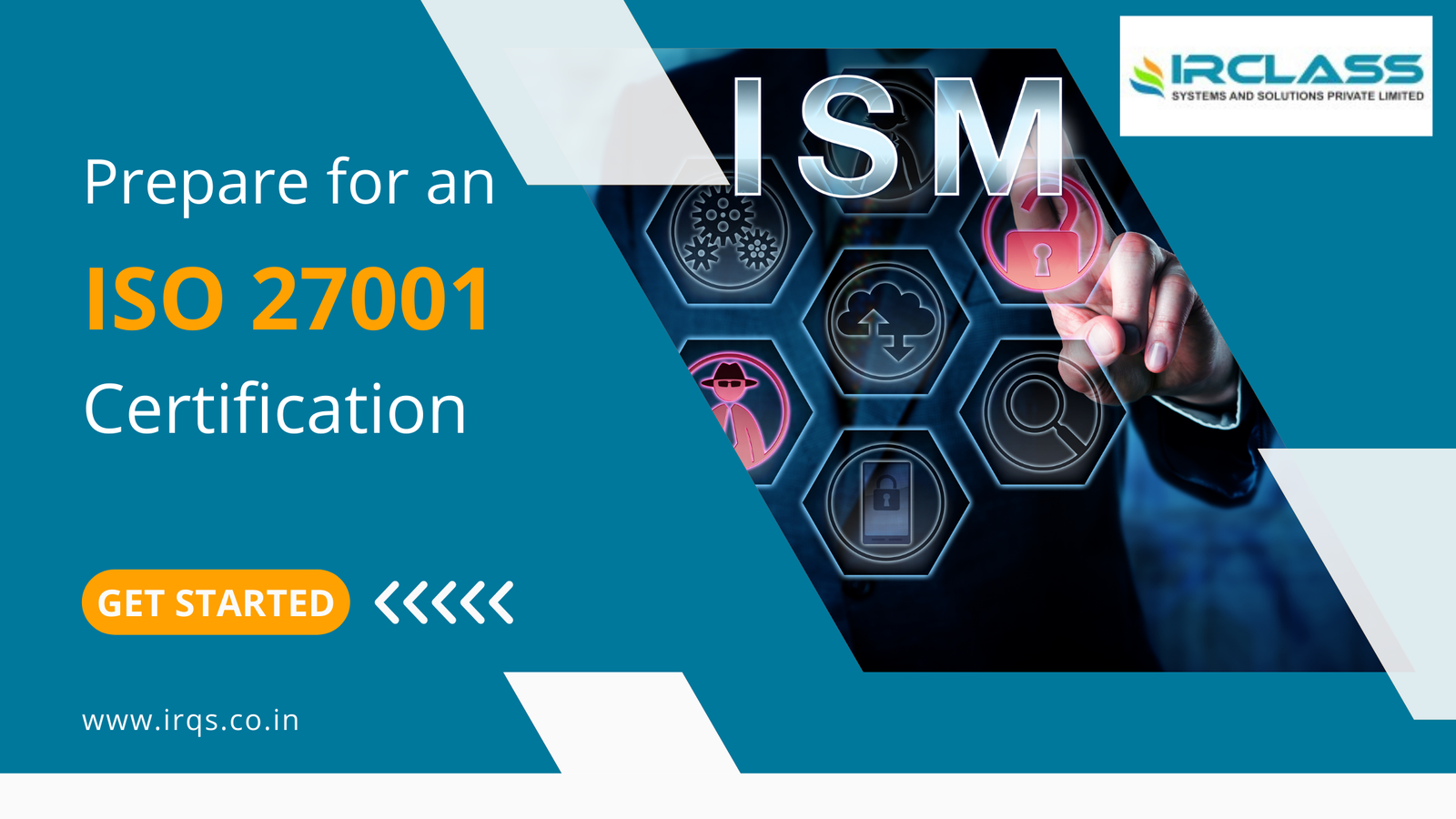
How to Prepare for an ISO 27001 Certification Audit
How to Prepare for an ISO 27001 Certification Audit A Precise Guide to Prepare for an ISO 27001 Certification Audit of Your Organization Introduction to ISO 27001 ISO 27001 is an international standard for helping organizations manage their information security. It contains requirements for an information security management system. Achieving certification according to ISO 27001 will go a long way in showing proof that you are a security-conscious organization. The reason to Prepare for the Certification A proper and systematic preparation for an audit is essential for any organization to get an ISO 27001 certification. In this way, an organization will be set for such an audit exercise; above all, the exercise could provide a way of pinpointing and addressing problems that may arise. In this connection, it saves a lot of time and resources. Steps to Prepare for ISO 27001 Certification Audit 1. Comprehension of ISO 27001 Requirements First, know the standard ISO 27001 by reading its official documentation. Know what the standard requires and comprehend the structure of ISMS. Get to know about the policies and controls that are needed. 2. Conduct a Gap Analysis A gap analysis identifies areas in need of improvement. Compare what you are doing against the requirements in ISO 27001. Make a list of the differences. This way, you know what to direct your efforts toward. 3. Create an Implementation Plan Formulate a plan based on the gap analysis, which shall specifically outline the steps to be taken in bridging the gaps. Assign responsibilities for each task identified at point two to team members. Timelines shall be set for each assigned task, and all members shall be clear on what they should do. 4. Train Your Team Make sure your team knows what ISO 27001 is all about. Conduct training sessions to explain why information security is essential. Teach them the policies and procedures to ensure that each one knows their role in maintaining security. 5. Document Everything Documentation is critical in ISO 27001. You need to Record all processes and procedures that your organization follows. These documents are meant to include: – Information security policies – Risk assessment processes – Security controls – Incident response plans Maintain these documents and keep them current, ensuring they are easy for anyone in your group to access. 6. Implement Security Controls ISO 27001 prescribes specific security controls that you need to implement. The controls will protect your information. Implement these controls in your organization. Here are some examples of controls: – Access control systems – Encryption – Backup procedures – Physical security measures To verify if these controls are effective. 7. Conduct Internal Audits Internal audits help to identify your weaknesses before the certification audit. Conduct internal audits regularly to verify whether ISMS is operating according to plans. Find out any weaknesses and correct them as quickly as possible. 8. Address Risks Risk management is an integral part of ISO 27001. Information risks shall be identified beforehand. Possible effects thereof will be evaluated, and effective measures to mitigate those effects will be adopted. Besides, your risk management plan shall be reviewed and updated regularly. 9. Perform Certification Audit Make complete preparations as the certification audit approaches. Review your documentation. Have all the security controls in place. Conduct a last internal audit. Remediate any last-minute issues. 10. Choose a Certification Body Select an ISO 27001 audit body that is reputable. Check if the selected body is credited and fully accredited—schedule for the audit. 11. Conduct the Certification Audit The certification audit is carried out in two phases: Stage 1: The Auditor goes through your documentation. They verify the design of your ISMS. Stage 2: The auditor evaluates the effectiveness of your ISMS implementation by reviewing security controls operation. Answer questions. Turn in all requested documents. Be cooperative with the auditor. 12. Conforming Non-Conformities Non-conformities shall be reported by the auditor whenever problems are detected. Address these non-conformities quickly. Implement corresponding corrective actions. Provide evidence of such actions to the auditor. 13. Maintain Your ISMS It’s not a one-off event, and maintaining the ISMS requires regular reviews and audits, keeping documentation up to date, and continuous improvement of security practices. 14. Communicate with Stakeholders Keep everyone involved: employees, customers, and partners. Show that your certification to ISO 27001 offers benefits. Present it as a demonstration of your profound concern for ensuring information security; hence, it builds trust and confidence. 15. Monitor and Measure Performance Your ISMS performance management: Key performance indicators—to measure effectiveness, regularly review these metrics and implement improvements as necessary to attain security enhancement. 16. Stay Current Information security standards change over time. Be informed about the changes in ISO 27001. Update ISMS and it will help you continue following the newly set standards. 17. Use Technology to Your Advantage Leverage technology in managing your ISMS. Software tools could be used for documentation and risk management. As many processes as possible should be automated; this way, the compliance burden will be reduced. 18. Support the Security Culture Foster a security culture within an organization. Encourage staff to adhere to security policies. Reward good security practices and this way make information security part of day-to-day work. 19. Find Help Externally if Needed If you’re encountering difficulty with it, look for outside help. Consultants can give you expert support with their experience; they can help in gap analysis, training, and implementation. This may relieve the certification process somewhat. 20. Reflect and Always Improve Quality lies within continuous improvement, so at all times, review your ISMS, look for improvements, and implement the change; it makes your ISMS effective and compliant. Conclusive Note ISO 27001 certification audit preparation involves a well-researched and detailed process. This consists in understanding the standard and conducting gap analyses on controls. Other key activities include training for the team, the documentation of processes, and internal audits. And, of no lesser importance to it, the assessment of non-conformities, the maintenance of your ISMS, and fostering a culture of security—thereby affording you a better opportunity

Achieving SOC 2 Compliance: Ensuring Trust in Data Security
Achieving SOC 2 Compliance: Ensuring Trust in Data Security In the fast-paced digital landscape, data security is paramount for all organizations. Over time, more organizations have become cent percent dependent on technology to conduct business operations. Organizations must handle sensitive information with robust security controls. As a result, ISO frameworks have become critical. SOC 2 is a well-known auditing standard. It was designed by the American Institute of Certified Public Accountants or AICPA. The global standard is essential to assess the information security controls in an organization. SOC 2 audits are ideal to review the effectiveness of the data security system. It also reviews data availability, integrity, confidentiality, and privacy norms. Service Organization Control 2 – A brief outline SOC 2 or Service Organization Control 2 is a set of well-defined guidelines for organizations that need data management and storage. Companies that store, process, access, and transmit sensitive data need the SOC 2 certificate. It provides a well-defined and comprehensive framework for evaluating the effectiveness of an organization’s security measures and practices. Data security, integrity, confidentiality, privacy, etc., are the key focused areas of the SOC 2 framework. Any organization firm can adhere to the trust principles of the certification program depending on the business practices. The framework helps maintain the data systematically with optimal convenience for the organization’s regulators, business partners, and suppliers. Choosing SOC 2 for your organization – Prime benefits Overview of the certification steps – Know it rightly The certification steps for compliance with SOC 2 are – There are two types of SOC 2 reports: Consider the certification – With the help of the framework, create detailed data security and management policies that address the prime trust services of the compliance program. The systematic and proactive approach facilitates risk management, access management, incident responsiveness, and data protection in the long run. An in-depth and comprehensive gap analysis can help identify areas that may fall short of SOC 2 standards. Get a chance to create a roadmap for achieving compliance by considering the certification. Gain in the competition with enhanced reputation Closing note – Ensure continual improvement with SOC 2 compliance SOC 2 certification promotes a consistent upgrade mindset for organizations. The framework helps continuously monitor and enhance the data security controls, policies, etc. Get a chance to conduct periodic audits with the professionals and demonstrate your commitment to data security. SOC 2 assessment is more than just a checkbox exercise because it delivers a systematic solution for safeguarding sensitive customer information without disrupting the integrity of systems and processes. Ensure optimal compliance and gain professionals with the best reputation. Also, compliance offers tangible benefits for all organizations, regardless of the size or industrial sector. Get a chance to prevent data breaches and unwanted financial losses and boost the overall reputation of the organization. Make a prudent choice by considering the ISO certification and ease your worries.

Understanding ISO 50000 for Energy Management: Unlocking Efficiency
Understanding ISO 50000 for Energy Management: Unlocking Efficiency Energy management with the help of the ISO framework helps maintain the best practices for an organization and strengthens its reputation. ISO 50000 framework promotes the ideal techniques for energy utilization promoting optimal functional effectiveness. It is a voluntary global standard for implementing and promoting an efficient and responsible energy management system. The framework assists organizations in implementing an energy management system with proactive measures. The ISO standard delivers a competent framework and methodology to boost energy proficiency without compromising utilization or efficiency. The framework consists of a bunch of systems, estimations, and norms that help achieve energy-related goals. Purpose of ISO framework – Understanding rightly ISO 50000 delivers a systematic approach to the documentation, acquirement, and management of an energy efficiency plan in an organization. The certification program defines the best energy effectiveness suggestions and emphasizes energy efficiency goals in the long run. ISO 50001, the gold standard for energy management certification, demonstrates a consistent improvement management framework. The approach is similar to that of ISO 14001 and ISO 9001. Obtain an administration framework with an efficient strategy that helps accomplish energy conservation and management goals. Among the different ISO framework objectives, energy effectiveness is prominent in the ISO 50000 certification program series. Benefits of the ISO framework – Why does your organization need EnMS? The ISO framework is ideal for all organizations that consume energy. The framework norms apply to all organizations, regardless of industry, size, or organizational culture. It emphasizes the best ideal practices for energy-related operations. The norms ensure continuous progress in energy efficiency, without reducing the energy utility in any way. Also, the ISO standard facilitates enterprises to utilize the framework with other management standards of the ISO series. Hence, it benefits organizations in multiple ways for long-term energy gain. Reduce energy cost and consumption EnMS is vital for an organization because the systematic framework helps responsibly utilize energy. Ensure the best control on energy utilization and boost energy productivity. Reduce the chances of energy mismanagement and wastage at the best cost. Impact the climate change positively Get a chance to decrease the ecological impact of the organization by consuming less energy. The ISO framework promotes the preservation of resources, facilitating environmental change. Highlights of ISO certification 1. Boost energy efficiency2. Cost reduction3. Ensure a competitive gain4. Enhance energy effectiveness5. Implement the best energy practices6. Enhance energy performance in the organization 7. Impact and improve organizational reputation8. Ensure continuous improvement Gain professionally with ISO certification. The Energy Management System reflects the best practices for a business with optimal legal compliance. A company with ISO certification can achieve the ultimate goals of resource utilization. All these helps acquire the prime opportunities for a business, thereby saving the budget and natural resources. ISO 50001 and 50000 promotes a culture of continuous improvement, encouraging optimal measures of energy monitoring, measurement, and performance assessment. Closing note Achieving the ISO certification exhibits the commitment of an organization towards energy management and its credibility in the industry. Implementing the best practices of energy management systems helps yield several benefits to organizations. Make a prudent choice by considering the certification.

Implementing ISO Quality Management System: Achieving Excellence
Implementing ISO Quality Management System: Achieving Excellence QMS, or quality management system, refers to a well-defined management system that ensures systematic documentation of different operational stages. It includes well-defined documents of procedures and demonstrates responsibilities for achieving the best quality policies in an organization. A QMS has a significant role because it helps coordinate and develop the activities in an organization. The quality management system caters to the requisites of customer and regulatory norms. All these help improve the effectiveness and efficiency of the organization to the next level. The best-in-class quality management system determines the company’s performance in more ways than one. The perks of having a well-defined QMS are – ISO 9001 – The benchmark standard ISO 9001 is the top ISO Quality Management System. The ISO certification is globally recognized and implemented across diverse industrial sectors. It is a popular quality management system standard. ISO 9001 defines the prime requirements for an efficient QMS. All organizations can use the ISO framework to develop customized programs. The different ISO standards related to quality management systems fall under the ISO 9000 series. ISO 9001 is the international standard offering a prominent solution to organizations searching for a robust quality management system that meets their needs. The framework is apt for organizations with different requirements, simplifying the hassles to the next level. Focused areas of a QMS – The different facets of a robust quality management system help attain the organizational goals. With the best practices, it is convenient to meet the dynamic requisites with optimal resources. A robust QMS, based on the ISO guidelines can address the unique needs and meet the following – Achieving excellence with ISO 9001 The ISO Quality Management System based on ISO 90001 incorporates a systematic and process-based approach. The framework highlights the importance of comprehending the cohesive activities in an organization. It mandates an organization to clarify the operational processes, recognize the key performance indicators (KPIs), and define the quality objectives for continual improvement. Better customer satisfaction ISO 9001 framework helps meet the customer requirements. It simplifies the ways of understanding and sufficing the expectations of the clients. Efficient operations The ISO standard boosts organizations and their operations. It helps streamline the procedures, reducing inconsistencies and inefficiencies. Improvement and consistency ISO 9001 demonstrates a systematic approach for optimal quality management with the scope of continual improvements. Professional engagement Ensure proactive professional engagement of employees in the quality management process. The ISO 9001 framework fosters a proactive and professional culture of employee accountability with enhanced engagement. Trade benefit ISO guidelines enhance the reputation of an organization and help the company earn a competitive edge among customers, partners, and stakeholders. Why does it matter? Significant steps of achieving excellence A customized QMS approach – ISO for your organization ISO standard framework provides a strategic framework with a flexible and disciplined approach for optimal quality control and management. The guidelines facilitate organizations to create product targets and achieve quality goals in the long run. ISO 9001, the global standard of QMS implementation is also compatible with various ISO frameworks. (for example – ISO 14001). One can implement the best standards with clarified documentation steps and eliminate redundancies. The ISO guidelines apply to companies involving operations of designing, manufacturing, and supplying. All organizations belonging to the following industrial sectors can leverage the benefits of the ISO framework. Highlights – At a glance The implementation of an ISO Quality Management System helps ensure optimal compliance with global regulations and requisites. A company can exhibit a regulatory-compliant image and ensure customer-focused commitment to offering high-quality services. The ISO standard implementation helps streamline the operational processes and eliminate the chances of unwanted operational risks and errors. With the best QMS practices, achieve operational success and excellence. Closing note The diverse benefits of a robust QMS backed by the ISO 9001 framework extend beyond the compliance requirements. It is an ideal solution for an organization willing to amplify the trade options with optimal quality commitment. The quality maintenance practices contribute to sustainable growth, promoting competitiveness with an enhanced reputation in the global marketplace. Ensure a proactive quality management and maintenance approach to achieve excellence in the long run.

Demystifying ISO Information Security Standards: A Comprehensive Overview
Demystifying ISO Information Security Standards: A Comprehensive Overview Undoubtedly, it is a digital age, and safeguarding the data is critical for all businesses and industrial sectors. The organizations have become well aware of the new-age privacy protection laws. It is vital to strengthen the guidelines for the protection of personal data. In fact, it is a paramount concern for all. With time, the dependence on digital technology has increased, and it will amplify in the coming times. With the impeccable rate of data collection and processing, it is the need of the hour to implement a robust system for data privacy and security. Hence, Privacy Information Management Systems or PIMS have become a vital concept across the globe. The international standards and well-defined framework outline the significant processes, policies, and procedures. The guidelines help manage and safeguard personal data. ISO 27001 – Identify the crucial role ISO 27001, the internationally recognized standard for information protection systems is the best solution for all organizations. The globally recognized framework outlines the requirements for creating, implementing, maintaining, and facilitating an ISMS (information security management system) inside an organization. The ISO standard for information security points out the dynamic threats and risks. It offers a comprehensive setup that ensures a hassle-free implementation of a systematic and risk-based approach for an organization. ISO 27001 boosts the norms of Privacy Information Management Systems (PIMS) and helps nurture a proactive approach towards data protection. With the well-defined guidelines of ISO 27001, manage personal data without hassles. Find well-defined solutions for data collection, processing, storage, transfer, and much more. The international framework exhibits optimal commitment towards data and privacy rights protection. It enhances customer reliance in the long run. The purpose of the ISO framework – A comprehensive overview The ISO (International Standard Organization) is an independent and non-governmental organization. The ISO 27001 framework is a global standard defining prerequisites for an Information Security Management System (ISMS). Currently, it is the leading standardization certification acknowledged by organizations across the globe. The purpose of the ISO framework is to safeguard critical information systematically. The guidelines offer a cost-effective solution that fits the requirements of organizations belonging to different industries. The objective of an Information Security Management System (based on the ISO guidelines) is to protect – The perks of implementing a robust ISMS – Nurture professional relationships with ISO 27001 Prime components of ISO 27001 – Know them rightly Information security controls and norms – Implement the best policies approved by management and boost the efficiency level. It covers administrative, technical, physical, and security concerns, mitigating information security threats from all angles. Risk management and treatment – The ISO framework emphasizes the selection and implementation of streamlined security controls. These are proactive measures to reduce the information security risks. The well-defined and structured process helps analyze the information security threats and identify the potential impacts of the unforeseen threats for the organization. With the best framework guidelines, identify the appropriate risk treatment measures and implement them efficiently. Management and assessment – Regular audits and assessments are necessary for the continual improvement of ISMS. The internal and external audits help identify non-conformities. Review the dynamic opportunities for improvement and ensure consistent improvement. Also, it helps the employees stay aware of the ever-evolving information security policies at a global level. Wrapping pointers – Recognize the pros of the ISO framework. The data management standards evolve with time. It is vital to cope with the changes. Only continuous improvement in information management practices can ease the needs. Hence, organizations must implement a proactive approach. The cyber threats are challenging to manage, but the robust ISMS system can mitigate the chances of encountering data-based risks. Among the various international guidelines, ISO 27001 stands out as a holistic ISO standard for information security solutions for organizations with a risk-based approach aligning the business objectives.
Search
Useful Links
Recent Posts

PAS 2050 vs ISO 14067: Which Carbon Footprint Standard Should You Choose?
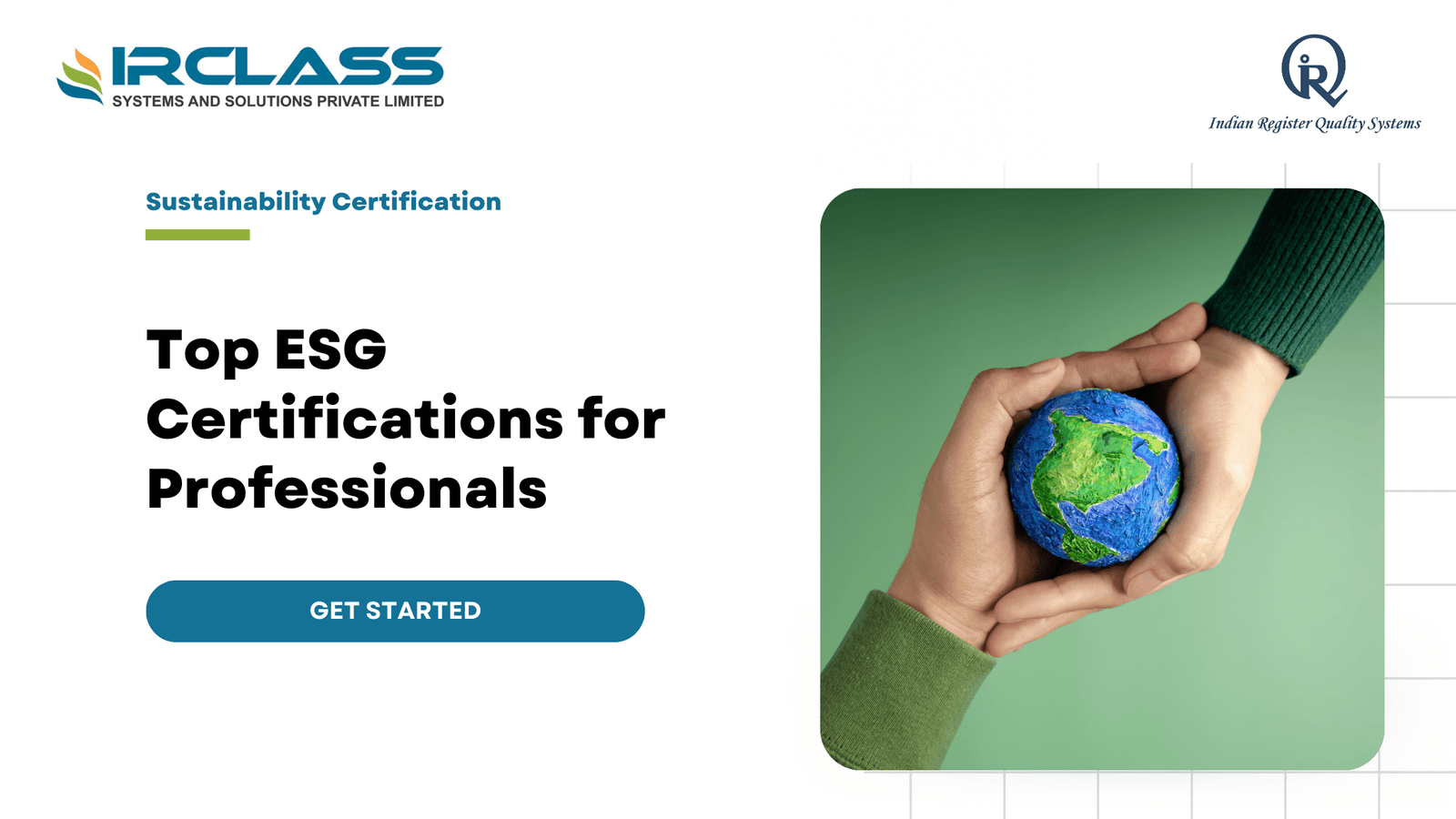
Top ESG Certifications for Finance, Sustainability, and Compliance Professionals
